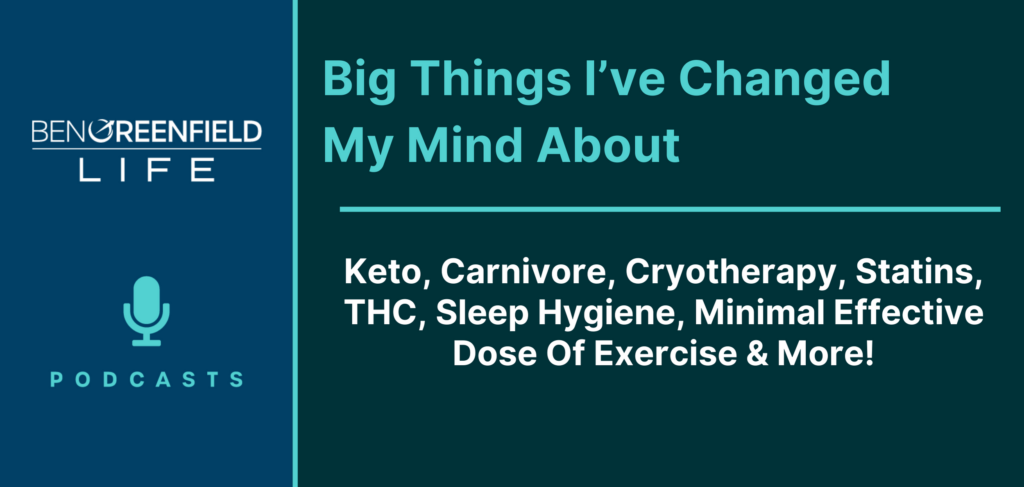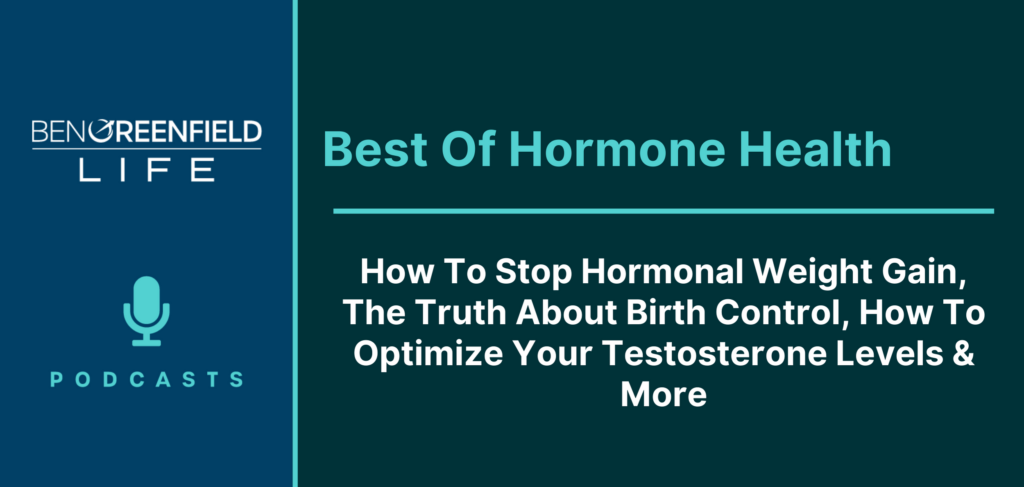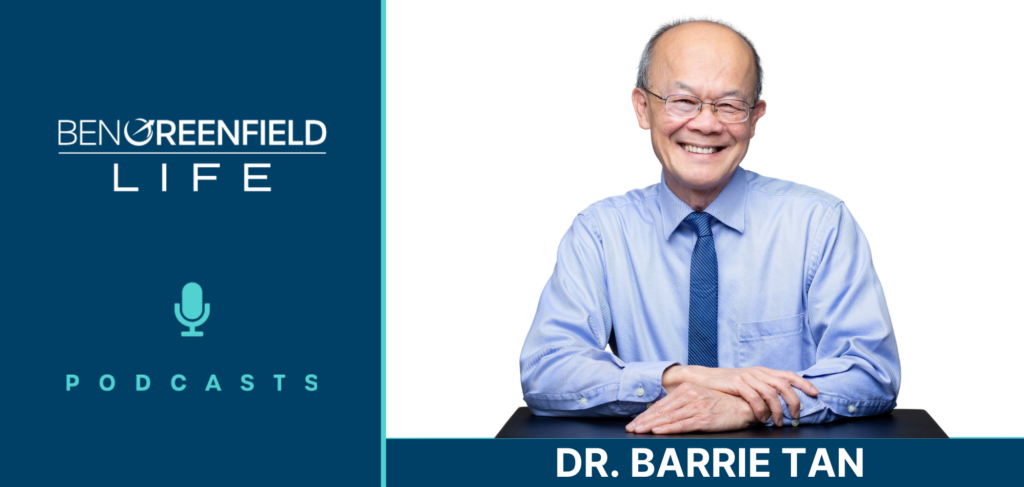June 24, 2017
Click here for the full written transcript of this podcast episode.
I first interviewed Dr. Michael Ruscio in the podcast episode “Why Healthy People Get Broken Guts, And What You Can Do About It.”
In that discussion, we delve into:
-Dr. Ruscio’s personal diet, and what his typical day looks like (including his meal of choice at Whole Foods)…
-The surprising things that happen to your gut when you combine calories and high levels of physical activity…
-Whether athletes should fast, and what happens when an exercise enthusiast “stops the flow of calories” and fasts…
-How an “elemental diet” works to reduce stress on the gut…
-When you actually should consider starving the bacteria in your gut…
-Whether you can combat “overstressing” the gut with food by simply using things like digestive enzymes…
-The biggest mistake most people make with cleanses, enemas and detoxing…
-How you can heal damage to the valves passing through your gut…
-If you could test anything and everything going in your gut, what you should test…
-And much more!
Dr. Michael Ruscio is a functional medicine practitioner, researcher, and author. His specialties include autoimmune, thyroid, and digestive disorders. He consults clients locally in the Bay Area and remotely across the country. His clinical research is focused on digestive disorders. Dr. Ruscio has been a featured speaker at numerous conferences including the SIBO Symposium, PaleoFX, Ancestral Health Symposium, and an international symposium in London. He’s also spoken for several online health summits, including Sean Croxton’s Digestion Sessions.
Dr. Ruscio has collaborated with many authorities in the health and wellness industry, including Robb Wolf and Melissa Hartwig. He has been interviewed on several popular podcasts such as Sean Croxton, Robb Wolf, Ben Greenfield, and Jimmie Moore, and he’s provided clinical training for Designs for Health and the SIBO Symposium. Dr. Ruscio also conducts a very highly rated functional medicine podcast. You can visit his website and podcast here.
Today, Dr. Ruscio is back with the latest research on carbohydrates and the gut, and during Part 2 of our discussion, we dive into:
-Michael's take on the statement that “all carbs get converted to glucose so there is no such thing as bad carbs” and whether there is a consensus regarding the role of all carbs, good carbs, bad carbs, high carbs and low carbs…[8:11]
-Why Michael doesn't like food allergy tests or use them much in his practice…[13:10]
-The role of carbohydrates or carbohydrate avoidance when it comes to a digestive condition like IBS (gas, bloating, abdominal pain, constipation, lose stools)…[19:40, 21:45 & 32:10]
-How the microbiota influences this and whether people with digestive conditions need to feed their healthy bacteria in order to feel better, and if so, how do they do that if they're eating low carb…[20:20 & 23:45]
–Whether a low carb diet really damages your thyroid…[40:40]
-The impact of artificial sweeteners on a low-carb diet and the truth about stevia…[56:15]
-Whether you really need to run like the plague when a supplement or bar has, say, 10g or 20g of carbohydrates…[52:30]
-The impact of a low-carbohydrate diet on testosterone levels…[64:30]
-And much more!
Resources from this episode:
–My podcast episode with Robb Wolf
–My podcast episode on stevia and Zevia
-Article: Low carb diets decrease thyroid autoimmunity
-There are many studies showing traditional low fat/high carb diets that increase fiber, fruit, vegetable and whole grain intake all help with heart disease and obesity, including:
http://www.ncbi.nlm.nih.gov/pubmed/18005489
http://www.ncbi.nlm.nih.gov/pubmed/8941095
http://www.ncbi.nlm.nih.gov/pubmed/20573945
http://www.ncbi.nlm.nih.gov/pubmed/24929874
http://www.ncbi.nlm.nih.gov/pubmed/14980987
http://www.ncbi.nlm.nih.gov/pubmed/25552267
–Low carb diets may improve thyroid autoimmunity issues
-Hunter gatherer lifestyle (paleo diet) improves metabolism, but t3 decreased
Show Sponsors:
biOptimzers – Crank your muscle gains to new heights by flooding your muscles with maximal amino acids without increasing your protein intake. Go to BenGreenfieldFitness.com/biOpt to automatically get 10% off your order.
Organifi – For the best tasting greens superfood blend, go to BenGreenfieldFitness.com/organifi and use code BEN for 20% off your order.
Four Sigmatic – Try out the Reishi Elixer for extreme relaxation without any grogginess. Use promo code BENGREENFIELD at FourSigmatic.com/greenfield to get 15% off your order.
Quip – Quip is an electric toothbrush that packs premium vibration and timer features into an ultra slim design, that's half the cost of bulkier brushes. Go to getquip.com/BEN to get your first refill pack free with a Quip electric toothbrush.
Do you have questions, comments or feedback and good carbs and bad carbs? Leave your thoughts below and either Dr. Ruscio or I will reply, and click here if you want access to a consult with Dr. Ruscio!














I sent an earlier email and never received a reply. I am very confused about the whole issue of combining starch with protein. Can you please clarify? Should I not be eating sweet potatoes with my meat or fish? Dark chocolate after a meal that contains proteins? I obviously need carbs and also eat protein at least two meals.
This would be a great episode for you to listen to – https://bengreenfieldfitness.com/2014/10/296-does…
The carbs quote came from the “What the Health?” documentary on NetFlix.
Would love to hear a rebuttal podcast to the documentary…
Despite it being popular, I have not yet had a chance to watch the film. If I do- I will be sure to post my thoughts!
Bump! Would love to hear your thoughts on the info presented in the documentary.
Oustanding podcast Ben and Michael! Thanks so much for sharing this. I have a couple of type 2 diabetes clients which have irregular fluctuations is blood sugars which don’t make sense so this information could be the missing link! :-)
I think full disclosure is really important. He is a chiropractic doctor, not an M.D. If that difference is important, it should be stated clearly.
Not sure why that distinction is important. I find Dr. Ruscio AND Ben AND the many other non-MD’s on these podcasts more well read and discerning of the “medical” literature than the majority of MD”s I have encountered. MD does not equal higher credibility regardless of what the privileges granted them are.
Let me start off by saying that this interview was pivotal for me. Bravo, Ben and Dr. Ruscio, for recording one of the best discussions about this topic that I have ever heard. And I listen to a lot of these!
For years, I have slowly reduce my carbohydrate intake due to severe digestive issues that seems to result when I eat more carbs. I bought into the fiber fiber fiber argument, only to find myself getting more bloated and more sick and more tired. As I started to research more about ketogenic diets, and began lowering my carbon take even more, I had so much less inflammation, more energy. My bowel movements are definitely not as prominent, but I still feel better on lower carb.
I’m a Master’s student getting my degree in integrative medicine from the George Washington University and have a lot of background knowledge in the digestive system. Some of my professors are still on the bandwagon of feeding the gut microbiome and advocating lots of fiber. Others have the same opinions as Dr. Ruscio.
I do have to agree wholeheartedly, however, with Dr. Ruscio that it seems there is a major bias in the current dialogue about the gut microbiome. Not everybody’s ecosystem is the same, so why are we thinking everyone will respond the same to broad spectrum approaches like loading up on fiber and constantly feeding the gut microbiome?
There have been societies that ate only meat for periods of time, and were not feeding their gut microbiome in the modern sense, and they were fine!
Thank you again for taking the pressure off of those of us who feel better on a lower carbohydrate diet. Thank you for the brilliant discussion and knowledge. I’m going to be listening to this over and over again!
So, I had to take Antibiotics for two weeks because they found I had H.Pylori. After finishing Antibiotics I’ve taken Probiotoics and Digestive Enzymes daily. I’m on a ketogenic diet for over a year now, and I’m trying to eat as many prebiotic foods as possible. Should I stop doing that? Thanks.
I tried the discount code BEN at the organifi link and it doesn’t recognize it. In fact, if you go to the website directly instead of through your link, the price is lower.
hmmm… let me look into this. Thank you for the heads up.